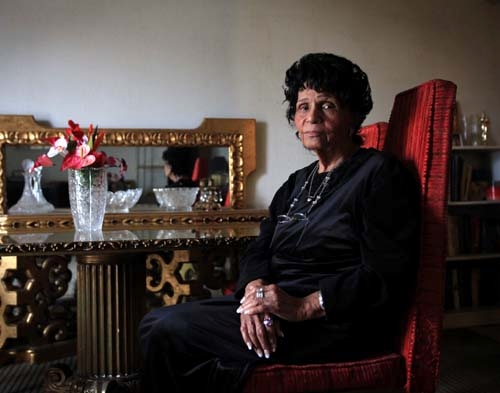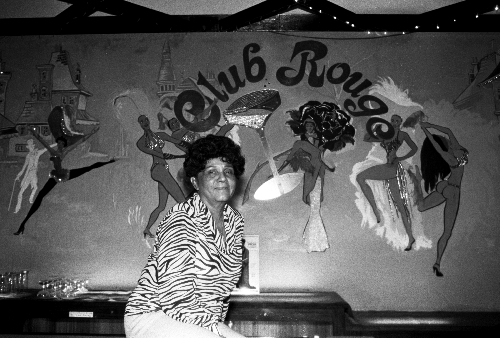Former co-owner of Moulin Rouge fought for civil rights




Sarann Knight Preddy considers herself an accidental local civil rights icon.
The 90-year-old former businesswoman, celebrated for being the first black woman to hold a Nevada gaming license and for long working to restore the historic Moulin Rouge, says many of her accomplishments stemmed from simply "being in the right place at the right time."
"It all just fell into place," Knight Preddy says while reminiscing in her home near Martin Luther King and Lake Mead boulevards, glasses perched on the tip of her nose. "I wasn’t thinking about it. I just stayed busy."
Others aren’t so quick to dismiss Knight Preddy’s important role in valley history.
"Her historical leadership and accomplishments are astonishing, especially when you consider the time in which she did them," says Wendell Williams, former assemblyman and founder of the Dr. Martin Luther King Jr. Committee.
The committee has named Knight Preddy co-grand marshal, with longtime local educators Theron and Naomi Goynes, of this year’s Martin Luther King Jr. Day parade.
"It means an awful lot to me," Knight Preddy says.
King "gave us something to be proud of. He represented progress."
Knight Preddy, born in 1920 in Eufaula, Okla., moved to Las Vegas in 1942 with her parents and husband at the time.
The family settled in the "Westside." The hub of the area at the time was Jackson Street, the black business district.
"It was all black clubs, as many clubs as were on the Strip," she said.
Knight Preddy, who always had wanted to work in gaming, soon got a job as a Keno writer in the Cotton Club.
She eventually opened a club for blacks in Hawthorne in Mineral County, called the Tonga Club.
The Nevada gaming license she obtained for the club was the first given to a black woman. She operated the club for seven years, then returned to Vegas.
"I have a love affair with Las Vegas," she says. "I left but I always came back."
Not long after she returned, Knight Preddy went to work at Jerry’s Nugget in North Las Vegas as an experiment. Officials with the National Association for the Advancement of Colored People were told the casino would hire a black dealer if they were qualified.
"I went in very confident," she says. "They needed me. I didn’t need them."
The job and money were great, she says, and she wound up staying seven years.
She didn’t think much about being the casino’s first black dealer.
"It didn’t really cross my mind, that I was helping black people get started," she says. "It was a tiny town then, with a small percentage of blacks. I never thought of myself as a pioneer. Now I do, I guess, because I’ve been here 68 years."
Others have long thought of her as such.
"She almost came here in a covered wagon," said Assemblyman Harvey Munford, D-Las Vegas, who has known Knight Preddy and her family for decades.
Later, Knight Preddy, together with her late husband Joe Preddy and son James Walker, were among a string of owners who tried to revitalize the Moulin Rouge, the city’s first integrated hotel-casino, at 900 W. Bonanza Road.
The club’s original owners closed the Moulin Rouge for financial reasons just six months after its 1955 opening, despite the fact that it made the cover of Life magazine and attracted headliners such as Frank Sinatra, Nat King Cole and Sammy Davis Jr.
On March 26, 1960, the Moulin Rouge gained a place in history when it became the site for the agreement that abolished segregation policies on the Strip.
The Preddys and Walker bought the property in 1985 and fixed it up from its decaying state.
But a number of plans for fully restoring the Moulin Rouge fell through when capital couldn’t be secured.
Despite the lack of commercial success, the Preddys and Walker were able to get the property placed on the National Registry of Historic Places.
After Joe Preddy suffered a stroke, the couple sold the property in 1997. He died in 1999.
The property "also fell in my lap," Knight Preddy says. "I enjoyed what I was doing and I wanted it to work. I opened the door, but just couldn’t get it going. I was tired, so I closed it up."
Knight Preddy "made a Herculean effort to try to resuscitate" the Moulin Rouge, says Michael Green, a historian and College of Southern Nevada professor.
Green calls Knight Preddy "the grand dame of West Las Vegas."
"She is a character unto herself," he says.
Munford also notes her "gallant efforts" to rebuild the Moulin Rouge.
"She has long done whatever she can to stimulate the economy and create jobs," he says. "She always wanted to revitalize the community, improve it in some way."
Knight Preddy, who also served on the executive board of the local NAACP and in 1979 ran unsuccessfully for Las Vegas City Commission, has remained active. She was one of the founders of the Las Vegas Black Historical Society, which is dedicated to ensuring the accurate inclusion of blacks in local history.
"I feel proud," she says. "Sometimes I think, ‘How did I do all of those things?’ Then I think, ‘I’m 90 years old. I had to do something.’ I wouldn’t know what to do with myself if I wasn’t busy."
Life hasn’t always been easy for Knight Preddy.
She has been married five times. She has outlived three of her four children.
Her granddaughter, Jamey Walker, was slain in 1981, her body found under a bridge at the Lake Mead National Recreation Area.
Knight Preddy says she doesn’t have much to show for her life of hard work. She lives on a fixed income and, to save money, is contemplating moving into a low-income West Las Vegas apartment complex that ironically is named for her.
But she doesn’t dwell on any of that.
"My life has been really great," she says. "I never worry about the past. I’m always looking toward the next thing."
Contact reporter Lynnette Curtis at lcurtis@reviewjournal.com or 702-383-0285.












